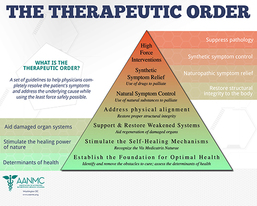 Defining naturopathic medicine can sometimes be challenging. Ask five naturopathic doctors what defines them, and you may get five different responses. I consider naturopathic medicine to be defined by its principles; any therapeutic approach which fulfills these principles can be considered naturopathic. An additional model has helped guide my clinical thinking. The therapeutic order puts the principles into an applicable hierarchy that can provide structure for making clinical decisions. Referring to this order reminds me to uphold the values that led me to this profession. Some criticize the order for being just that. They argue that it's not always appropriate to start at one end and move progressively toward the other. I would tend to agree; an urgent scenario may require pharmaceutical or surgical intervention. And not every situation requires something like structural adjustment. However, the individual who has suffered an acute heart attack, for example, would see the greatest health improvements by changing his lifestyle and tonifying his weakened cardiovascular system in addition to any medications deemed necessary. I have found consistently in practice that while pharmaceuticals and even natural health products can be very helpful, it is rare that they are transformative without also operating at the more foundational level of the therapeutic order. Truly, the most important level of healing is the first one - establishing the best possible conditions for health. Into this category fall things like good nutrition, adequate physical activity, effective stress management, sufficient quantity and quality of sleep, and avoidance of environmental contaminants (chemicals, noise, light, stress) that disrupt our homeostasis. Our bodies are exceptionally capable at reestablishing good health if we can clear the way and give them the building blocks. Time and again I see folks in my practice that are suffering in large part due to their inability to establish healthy lifestyle practices. When they're able to adjust their "determinants of health", it's amazing how well the body can bring them back to a state of well-being. Here's a little exercise to help you do this; I encourage you to use it as a seasonal check-in: Take a blank piece of paper. Write on it a list (8-10) of the most important lifestyle factors affecting your health and well-being right now. What are you doing that is supporting your health? What would you like to be doing, and are having a hard time implementing? What is happening in your life that is impeding your health? Some ideas to consider ... your diet; your work; your level of physical activity; your relationships; your time engaging in your hobbies; your financial well-being ... Draw a good-sized circle on your paper. Divide your circle into segments that represent the time/energy/weight you give each item on your list. How you define this is up to you. Take your time. Some items may not have any weight right now, although you would like them to. Perhaps represent them as a line in your circle. Other elements may feel like they're taking over your life, even if they don't consume that much time ... perhaps make them a significant chunk of the pie. Now draw another circle. This time, divide your circle into segments that represent how you would like these elements to be weighted. In a perfect world ... what would this look like? What kind of balance would allow you to move closer to the state of health you would like? Last step. Select one (or two) elements ... no more than that ... to work on adjusting right now. When you've identified what they are, and what exactly you would like to work towards, design a goal to help you get there. We know that the more specific and manageable the goal, the more likely we are to achieve it. So ... for example ... if I wanted to work on eating better, I might choose to consume five servings of vegetables (let's make sure I define a serving - half a cup!) three days out of the next five. It's specific, it's relevant to my priority, it's manageable, it's measureable, and it's time-bound ... all components of a well-articulated goal. If five days go by and I was successful, then hooray! Then I would set a new, slightly more challenging goal. If I was unsuccessful, then it would be a good idea to reflect on what got in my way, and perhaps set a smaller, more manageable goal. Remember that you might need to do some planning in order to increase the chances of success ... if I want to eat more vegetables, I'll need to make sure I buy them and plan out my menu a bit. If I want to do more exercise, I might need to get up a bit earlier in the morning to fit it in. If I want to communicate better with my loved ones, I might need to let them know that's the intention! Goals are often easier to achieve when you've let someone else know about them. I encourage you to work through this exercise with a friend and share your goals with one another. Check in to see how it's going and offer support. I'd love to hear how this goes for you! Send me a line or tweet me a pic of your circles!
0 Comments
|
Archives
January 2024
Categories
All
|
 RSS Feed
RSS Feed
